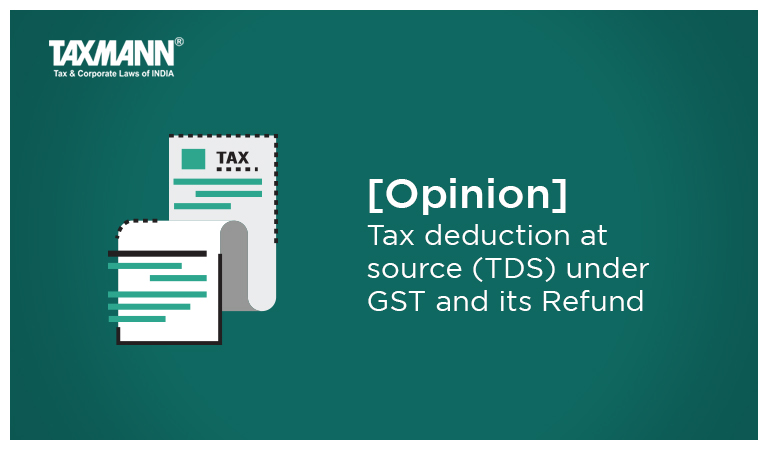[Opinion] Tax deduction at source (TDS) under GST and its Refund
- Blog|News|GST & Customs|
- 3 Min Read
- By Taxmann
- |
- Last Updated on 14 July, 2022

GST touted to be India’s most comprehensive tax reform in decades, is based on the principle of ‘one nation, one market, one tax’. The government has issued a series of notices, circulars, explanations and regulations over the last five years of the GST. The implementation of the Goods and Services Tax (GST) in India has vastly impacted all the business and especially the startups. This article summarises one of the crucial points under GST i.e. GST TDS and its refund related parameters that are required to be followed by the parties engaged in these types of transactions.
The provisions of GST TDS have been notified and made effective from 1-10-2018 by the GST Council in its 28th meeting held on 21.07.2018. This TDS is different from TDS under Income-tax Act,1961 and separate payments, returns and TDS certificates are required to be complied with and the provision for GST TDS fall under Section 51 of CGST Act,2017.
Applicability – GST TDS provisions apply where total value of such supply, under a contract, exceeds Rs. 2.50 lakhs (excluding GST) – section 51(1) of CGST Act. Thus, if contract is of value exceeding Rs 2.50 lakhs, TDS is required even if an individual invoice is less than Rs 2.50 lakhs. TDS applies if contract exceeds Rs. 2,50,000 even if single invoice under contract is for less than Rs. 2.50 lakhs.
The TDS provisions apply when payment is made or credited to supplier. Thus, if advance is paid on or after 1-10-2018, TDS provisions will apply.
Registration as deductor – The deductor is required to register by applying online through the portal www.gst.gov.in by using their PAN/TAN. He is required to register as deductor even if he is registered separately as supplier. Section 24(vi) of the CGST Act, 2017 provides for compulsory liability for registration for the deductors of TDS.
Person deducting GST TDS will be termed as ‘deductor’. Supplier from whose invoice tax is deducted will be termed as ‘deductee’.
Rate applicability – The rate of TDS is as follows – (a) in case of intra-State (i.e. within the State) supply of taxable goods or services or both = 1% of CGST plus 1% SGST/UTGST (total 2%) [section 51(1) of CGST Act and SGST Act] (b) in case of inter-state supply of taxable goods or services or both – 2% of IGST [first proviso to section 20 of IGST Act].
The deduction is from payment made or credited to the supplies exceeds Rs 2.50 lakhs per contract.
Following would be the deductors of tax in GST under section 51 of the CGST Act, 2017 read with notification No. 33/2017-Central Tax dated 15.09.2017:
(a) a department or establishment of the Central Government or State Government; or
(b) local authority; or
(c) Governmental agencies; or
(d) an authority or a board or any other body,- (i) set up by an Act of Parliament or a State Legislature; or (ii) established by any Government, with fifty-one per cent. or more participation by way of equity or control, to carry out any function; or
(e) a society established by the Central Government or the State Government or a Local Authority under the Societies Registration Act, 1860 (21 of1860); or
(f) public sector undertakings.
Valuation- For the purpose of deduction of tax specified above, the value of supply shall be taken as the amount excluding the tax (CGST, SGST or UTGST and Compensation Cess) indicated in the invoice.
Thus, TDS is required to be on net value excluding CGST, SGST/UTGST and IGST.
Click Here To Read The Full Article
Disclaimer: The content/information published on the website is only for general information of the user and shall not be construed as legal advice. While the Taxmann has exercised reasonable efforts to ensure the veracity of information/content published, Taxmann shall be under no liability in any manner whatsoever for incorrect information, if any.

Taxmann Publications has a dedicated in-house Research & Editorial Team. This team consists of a team of Chartered Accountants, Company Secretaries, and Lawyers. This team works under the guidance and supervision of editor-in-chief Mr Rakesh Bhargava.
The Research and Editorial Team is responsible for developing reliable and accurate content for the readers. The team follows the six-sigma approach to achieve the benchmark of zero error in its publications and research platforms. The team ensures that the following publication guidelines are thoroughly followed while developing the content:
- The statutory material is obtained only from the authorized and reliable sources
- All the latest developments in the judicial and legislative fields are covered
- Prepare the analytical write-ups on current, controversial, and important issues to help the readers to understand the concept and its implications
- Every content published by Taxmann is complete, accurate and lucid
- All evidence-based statements are supported with proper reference to Section, Circular No., Notification No. or citations
- The golden rules of grammar, style and consistency are thoroughly followed
- Font and size that’s easy to read and remain consistent across all imprint and digital publications are applied



 CA | CS | CMA
CA | CS | CMA
